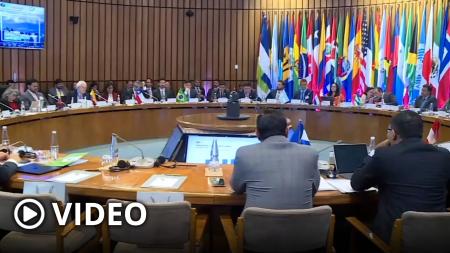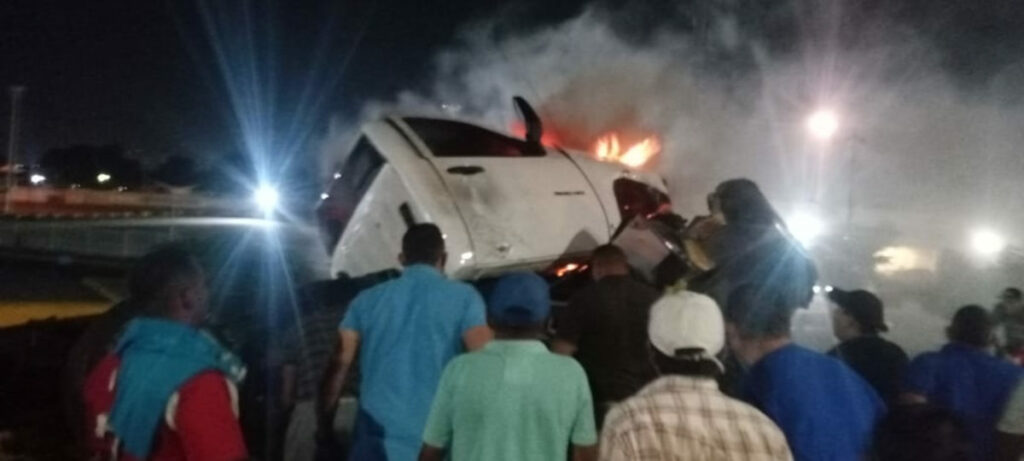The Minister of Economy, Sergio Massa, highlighted on Tuesday the credit of the Development Bank of Latin America – CAF for US$ 840 million granted to Argentina to carry out complementary works on the President Néstor Kirchner Gas Pipeline (GPNK) and for the implementation of a program for people with disabilities.
Massa met this morning in Santiago, the Chilean capital, with the CAF Board of Directors, headed by its president, Sergio Díaz Granados.
He also spoke in the framework of the Assembly of the multilateral entity, in which he highlighted the importance that the President Néstor Kirchner Gas Pipeline will have not only for Argentina but also for most of South America, to the extent that it will allow the transport of the resources generated in “the world’s second shale gas reserve”, in reference to the deposits in the Vaca Muerta area.
“Obviously, for my country this is a very important day,” the minister remarked, while valuing the role of CAF as “a very important instrument for development.”
For his part, diaz granados indicated that “these projects seek, on the one hand, to advance in the just transition by expanding the transportation of natural gas to the northern provinces of Argentina, and on the other, the financing of a comprehensive program that meets the needs of a vulnerable sector as are people with disabilities.
Massa also thanked CAF for the “very important” support for the Program for the Promotion of the Social Model of Disability and Access to Rights of Persons with Disabilities (Andis), to which US$ 300 million will be allocated.
The remaining US$ 540 million will be used for the Northern Gas Pipeline Reversal project, complementary to the GPNK.
Regarding this last disbursement, the head of the Palacio de Hacienda assured that “Argentina is carrying out a very important work within the framework of the development of a transitional energy matrix.”
This work will allow “the world’s second largest shale gas reserve We can take advantage of it as a resource, not only the Argentines, but we hope that it becomes an instrument to strengthen our energy matrix for Chile, for Bolivia, for Brazil, for Uruguay”.
Massa indicated that “in the years that preceded us we did not have the instruments” to be able to carry out these undertakings and stressed that CAF’s assistance allows “financing works like these for 15 years”, which give the opportunity “to Chile, to Argentina, Bolivia, Brazil and Uruguay to access one of the products, one of the world’s largest gas reserves, to have economic transition energy for the development of our industries.”
Economy specified -in a statement- that, “due to its multilateral nature, the gas pipeline is a work of enormous interest to CAF, because once it is completed, the Bolivian pipeline can be reversed to consolidate exports to neighboring countries instead of importing.” .
To its turn, the head of Enarsa, Agustín Gerezargued that “this financing allows us to continue transforming Argentina with a vision of a sustainable and sustainable future for households and industries in the north that will have access to gas at competitive prices.”
“The coordinated work between the Ministry of Economy and Enarsa allowed us to strengthen the development credit relationship with CAF,” added Gerez.
The multilateral credit organization detailed, for its part, that in the case of the North Gas Pipeline Reversion Projectwill contribute US$540 million of the US$702 million budgeted for the initiative, through an Investment Program that will be executed in an estimated period of up to 24 months by the Ministry of Economy through the Secretariat of Energy and Enarsa.
“The works will allow natural gas to be transported from the Neuquén Basin to the central and northern provinces of Argentina and, in the future, to export the surplus to Chile, Bolivia and Brazil.” and as a result “the drop in gas production from the NOA basin will be compensated and the substitution of natural gas imported from Bolivia will be allowed,” the entity said.
Also present at the Board meeting were the Corporate Vice President of Strategic Programming at CAF, Christian Asinelli, the Minister of Transportation, Diego Giuliano; the secretary of International Economic and Financial Affairs of the Ministry of Economy and director of INDEC (National Institute of Statistics and Censuses), Marco Lavagna, and the adviser on International Relations, Gustavo Martínez Pandiani.

















